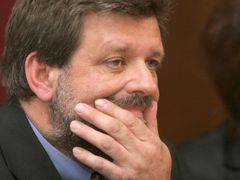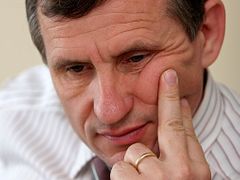Prague - It was not a bribe, only a loan in exchange of arranging deals with a state-controlled company. Officials took hundreds of thousands, but the problem is purely ethical. Therefore nobody is to be punished.
These are the conclusions drawn by state prosecutor Jana Hercegová who had dropped charges against eight state officials, businessmen and lobbyists linked to the Social Democratic Party (ČSSD) and the so-called bio-fuel case.
The case effectively started what later developed into a full-blown affair overshadowing the last stage of campaign before the 2006 parliamentary elections with police colonel Jan Kubice claiming there had been attempts by politicians to influence not only this, but many other politically sensitive cases.
Ms Hercegová announced her decision to halt the case two months ago but gave no further explanation back then.
Aktuálně.cz now gained access to the 19-page long written explanation of why the case was stopped.
Yes, they took the money, but
Police initially accused representatives of Bioferm company of hiring lobbyist František Vybíral with the specific aim of securing access to the rules which were being prepared by state institutions for what was shaping up to be a lucrative production of bioethanol.
Police says Vybíral received fifteen million Czech Crowns, spent most of it by paying off his outstanding debts and gave one million to the Transportation Infrastructure Fund head Josef Láznička and personal chief-of-staff of Deputy Transportation Minister Ludmila Schwarzová.
While state prosecutor claimed both of the above mentioned indeed took the money, she dropped charges against them arguing they had done so not in their official capacity, but only as private persons.
Besides, there is no evidence suggesting that they abused their office while taking the money. In other words, state prosecutor believes Mr Láznička and Ms Schwarzová received hundreds of thousands for merely connecting people from Bioferm with businessman and former minister Miroslav Grégr.
"While being state employees at the time, the two were not actually securing any favors, they just provided a contact to businessman Grégr, and they did so in their private capacity for a certain payment."
"Even as the question arises of whether such conduct conforms with the state employee ethic, it is not subject to criminal procedure since such an act is not criminal in itself," explains the state prosecutor in her verdict.
Echoes of the Čunek case
The case of Mr Láznička and Ms Schwarzová bears some similarities with the case of Deputy Prime Minister Jiří Čunek.
He was also accused of taking bribes, but a state prosecutor dropped the charges against him despite admitting that the origin of Mr Čunek's two million Czech Crowns in question remained unexplained.
He claimed then that this was a matter for a completely different investigation and he would have nothing to do with it.
Similarly, Ms Hercegová puts a question forward whether Mr Láznička and Ms Schwarzová ever paid taxes from the provision only to conclude that the issue is not subject to the case she was dealing with.
In the meantime, Mr Láznička and Ms Schwarzová keep denying they received any money from Mr Vybíral at all.
Mixing apples and oranges?
The conversations which police wiretapped and which circled around the money that was changing hands are rife with code words. Vybíral & Co. use expressions like 'half', 'two' or 'two oranges'.
Not even the wiretaps could move the prosecutor to send to court other members of the group including Mr. Vybíral and representatives of Bioferm.
She concluded the company gave Mr Vybíral 15 millions but she saw it not as a bribe, but as a loan, complete with a contract and book-keeping.
In exchange for this, Vybíral was to secure contracts which would have big companies including the state-controlled Čepro buying bioethanol from Bioferm.
Although the alleged loan was to be repaid within a month, Bioferm representatives only started reclaiming it from Mr Vybíral when it became clear he did not succeed at arranging any business deals.
"The telephone conversations prove that the accused Polák was repeatedly seeking information from Vybíral whether a contract would be sealed, why negotiations are taking so long and then, when it did not materialize, demanded Vybíral return the money."
"In the same spirit, effectively, the communication between Vybíral and Janata was taking place. The expression 'accelerator' is used by Vybíral during these conversations, within the context undoubtedly meaning a provision that was to help speed the process of securing the contracts."
"He told Janata in a mobile phone text message he was 'in deep shit' because he no longer had the money having spent it all believing the contract would be signed," the state prosecutor writes in her explication.
Insufficient evidence
Apparently, police was not able to provide enough evidence which would show how exactly Mr Vybíral was supposed to secure the contracts and whether bribes were to play part in it.
"Clear evidence is lacking which - within the complexity of the case - would support unequivocally the conclusion that Vybíral used any specific part of the 15 million sum he had been given by Bioferm to bribe any particular person into securing a favor for the company, or at least that he attempted doing so," opines the prosecutor.
And once again, she notes that Mr Vybíral and representatives of Bioferm are private persons who can pay each other as much provision money for contract procurement as they like since there is nothing criminal about it.
You can find the story in its original Czech version here.



